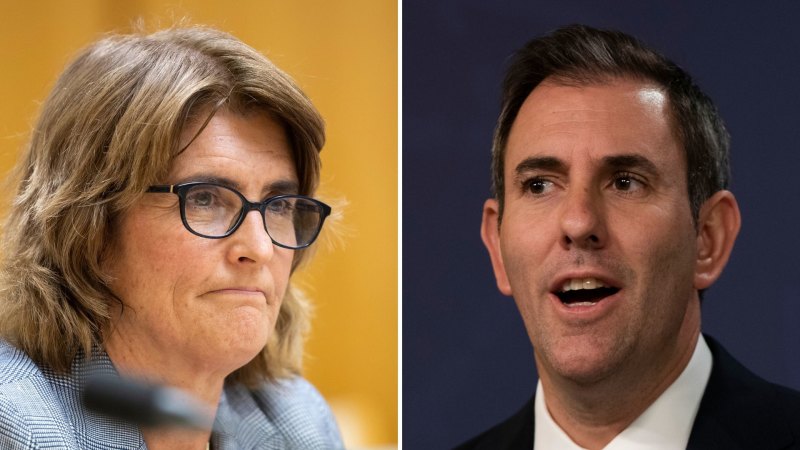Save articles for later
Add articles to your saved list and come back to them any time.
The Reserve Bank board has committed to aiming to get inflation to 2.5 per cent and being more transparent about its interest rate decisions in a new agreement with the treasurer.
Treasurer Jim Chalmers and new Reserve Bank governor Michele Bullock and her board have agreed to significant changes to the government’s expectations about the bank’s operations, in the first statement on the conduct of monetary policy to be drawn up since 2016.
RBA governor Michele Bullock, left, her board and Treasurer Jim Chalmers have come to a new agreement that will underpin the running of Australia’s economy.Credit: Alex Ellinghausen/Louise Kennerley
The RBA’s inflation target remains 2-3 per cent, but the new statement is more specific than the previous version, directing the RBA to aim for the middle, or 2.5 per cent.
The bank has been lifting interest rates since May last year to bring down inflation, which peaked at around 8 per cent at the end of last year. The latest monthly measure of inflation showed it falling to 4.9 per cent in October.
“The Reserve Bank board sets monetary policy such that inflation is expected to return to the midpoint of the target,” the statement said.
“The appropriate timeframe for this depends on economic circumstances and should, where necessary, balance the price stability and full employment objectives of monetary policy.”
Some of the changes outlined in the new statement won’t come into effect for months, after the government’s RBA legislation was handed over to a Senate committee for a review that will not be finished until the end of March.
This will delay plans to establish a new monetary policy board to take responsibility for interest rate settings and financial system stability, while a separate governance board will oversee the bank’s broader operations.
Chalmers said the statement, which sets out agreements with the Reserve Bank board and its governor Michele Bullock, came after extensive consultations between the central bank, its board, and Treasury.
“The statement reaffirms the government’s commitment to the independence of the RBA, sets out the agreed approach to meeting the board’s legislated objectives and helps implement recommendations of the RBA review,” Chalmers said.
Key changes to the statement on the conduct of monetary policy
- The statement is between the treasurer and the Reserve Bank board, not just the RBA governor
- It covers more ground: it’s nearly 1900 words, whereas the previous one was 1150
- That includes acknowledging the RBA has tools beyond setting interest rates, and commits to a review of those tools
- The statement says the RBA contributes to financial stability, whereas the previous one said that was the RBA’s responsibility
- There was greater emphasis on accountability, including a commitment to publish votes, publish more information that forms the basis of decisions, and do regular public appearances
- It outlines responsibilities for the two separate RBA boards, which will be created in the coming months
“This is part of the Albanese government’s commitment to ensuring Australia’s central bank remains world-class, with a monetary policy framework fit to meet current and future economic challenges.”
The RBA board also committed to publishing more information backing up its decisions, including economic analysis and insights from its business and community discussions.
It will also publish an anonymised record of how the board voted on interest rate decisions, while board members have committed to at least one speaking engagement a year. The RBA will also publish board papers after five years.
“The Reserve Bank board commits to clearly communicating how it is balancing its inflation and full employment objectives,” the statement said.
The statement outlined the responsibilities of the bank’s two boards, with those changes to come into effect once the legislation passes.
The treasurer said he was disappointed the Coalition teamed up with the Greens to delay the legislation in the Senate on Thursday night, voting to send it to a committee for review, with a reporting date of March 21.
“We’ve done our best throughout to include [shadow treasurer Angus Taylor] in briefings and discussions for more than a year now. We’ve taken his views seriously, and that’s reflected in the legislation before the parliament,” Chalmers said.
But Taylor said the Coalition made no apologies for sending the legislation to the Senate economics committee.
“The government’s response to the RBA review has not been subject to public consultation, and the draft legislation was not subject to conventional exposure draft processes,” he said.
“The Senate process will ensure Australians can maintain confidence in the Reserve Bank at a time when more and more [people] personally feel the impact of its decisions.”
Taylor said the government had not cleared up the Coalition’s concerns about how the current board members would transition onto the two new boards.
Cut through the noise of federal politics with news, views and expert analysis. Subscribers can sign up to our weekly Inside Politics newsletter.
Most Viewed in Politics
From our partners
Source: Read Full Article

